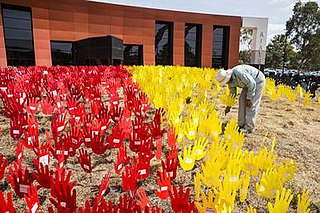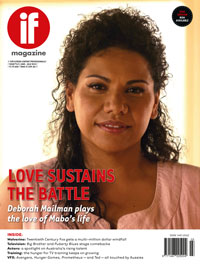Related Research Articles

The Australian Institute of Aboriginal and Torres Strait Islander Studies (AIATSIS), established as the Australian Institute of Aboriginal Studies (AIAS) in 1964, is an independent Australian Government statutory authority. It is a collecting, publishing, and research institute and is considered to be Australia's premier resource for information about the cultures and societies of Aboriginal and Torres Strait Islander peoples.
The NAISDA Dance College is a performing arts training college based in Kariong, New South Wales for Aboriginal and Torres Strait Islander people in Australia. It was established as the Aboriginal Islander Skills Development Scheme (AISDS) in 1975, which became the National Aboriginal and Islander Skills Development Association (NAISDA) in 1988. The date of establishment of the college is usually cited as 1976, although some sources report it as 1975.
Kevin John Gilbert was an Aboriginal Australian author, activist, artist, poet, playwright and printmaker. A Wiradjuri man, Gilbert was born on the banks of the Lachlan River in New South Wales. Gilbert was the first Aboriginal playwright and printmaker. He was an active human rights defender and was involved in the establishment of the Aboriginal Tent Embassy in 1972 as well as various protests to advocate for Aboriginal Australian sovereignty.

The Australian Music Centre (AMC), founded as Australia Music Centre in 1974 and known as Sounds Australian in the 1990s, is a national organisation promoting and supporting art music in Australia. It operates mainly as a service organisation, and co-hosts the Art Music Awards along with APRA AMCOS. It also publishes Resonate Magazine.

Woroni is the student newspaper of the Australian National University (ANU), based in Canberra, ACT, Australia. The name "Woroni" derives from an Indigenous Australian word meaning "mouthpiece". Woroni is published bi-monthly in full colour magazine format, and features broad coverage of university and local news, opinion, features, arts and culture, sports, and leisure. It was formerly published as Student Notes: Canberra University College Students Association.
Michael Riley was an Aboriginal Australian photographer and filmmaker, and co-founder of Boomalli Aboriginal Artists Cooperative. A significant figure in contemporary Indigenous Australian art, Riley's work is held by many public art institutions, including the National Gallery of Australia.

Fact is a music publication that launched in the UK in 2003. It covers UK, US, and international music and youth culture topics, with particular focus on electronic, pop, rap, and experimental artists.

Artlink, formerly titled Artlink: Australian contemporary art quarterly, is a themed magazine covering contemporary art and ideas from Australia and the Asia-Pacific. It covers a diverse range of issues, including social and environmental issues as well as media arts, science and technology.

IF Magazine, also known as Inside Film, IF: Australia's Filmmaker Magazine, and IF: The Magazine for Independent Filmmakers, is an Australian print and online trade publication for screen-content professionals in Australia and New Zealand.
Kriszta Doczy, formerly Krisztina Bodonyi, is a Hungarian born Australian film producer and founder of Contemporary Arts Media, a distributor of art films.
The Australian Museums and Galleries Association (AMaGA), formerly Museums Galleries Australia and Museums Australia, is the national professional organisation and peak council for museums and public art galleries in Australia. It advocates for the sector and provides a range of professional services to its members at a national, state and interest group level.
John Gillies is an Australian visual artist, filmmaker and musician, particularly known for his "multi-layered and complex" video works and installations. He has also curated a number of video art programs.
Philippa Ann Cullen was an Australian dancer, choreographer, teacher and performance artist. She was notable for her innovative dance performances incorporating the use of the theremin and the development of movement-sensitive floors known as Vernus floors. From the late 1960s until 1974 she taught movement and dance at many venues, in Australia and overseas. Her most important classes took place on Sunday mornings in the University of Sydney Quadrangle, and were attended by dancers, actors, musicians and artists.

4A Centre for Contemporary Asian Art, formerly known as Gallery 4A, 4A Galleries, Asia-Australia Arts Centre and also known simply as 4A, is an Australian independent not-for-profit organisation based in the Haymarket area of Sydney, New South Wales. It commissions, exhibits, documents and researches Asian and Asian-Australian contemporary art in Australia, and promotes Australian talent in Asia, promoting and maintaining cultural connections between the nation and the region. The gallery and the associated Performance 4A were founded by the Asian Australian Artists Association Inc. in 1997.
Message Sticks Festival, also known for some time as Message Sticks Indigenous Film Festival, was an arts festival celebrating the culture of Aboriginal Australians, based at the Sydney Opera House, between 1999 and 2013. It focused on film for several years, but music, theatre and dance were also showcased. The festival was succeeded by Homeground in 2014.
Alick Tipoti, whose traditional name is Zugub, is a Torres Strait Islander artist, linguist, and activist of the Kala Lagaw Ya people, from Badu Island, in the Zenadh Kes. His work includes painting, installations, printmaking, sculpture and mask-making, and is focused on preserving the culture and languages of his people.
Erik Griswold is an American-born, Australian-based composer and pianist from Brisbane.
Carole Yvonne Johnson is an African American contemporary dancer and choreographer, known for her role in the establishment of the National Aboriginal Islander Skills Development Association (NAISDA), and as co-founder of Bangarra Dance Theatre in Australia. Early in her career she became a lead dancer in the Eleo Pomare Dance Company, and Pomare had a profound influence on her dancing style.
The Aboriginal Publications Foundation (APF) was a national Australian Aboriginal organisation that existed from 1970 to 1982, based first in Sydney, New South Wales, and later in Perth, Western Australia. It existed to promote and fund creative arts projects by Aboriginal people, especially written works. It published a national quarterly magazine called Identity (1971–1982), which carried articles by many prominent Aboriginal rights activists.
References
- ↑ "Dance Advocacy". Ausdance. Retrieved 14 November 2021.
- 1 2 3 4 5 6 7 8 "About". RealTime. Retrieved 13 November 2021.
- ↑ McPherson, Angus (17 June 2020). "Arts magazine RealTime to cease regular publishing". Limelight. Retrieved 13 November 2021.
- ↑ "RealTime Arts". Realtime Dance. Retrieved 13 November 2021.
- ↑ Gallasch, Keith; Australian Film Commission (2007), Dreaming in motion : Celebrating Australia's Indigenous filmmakers, Australian Film Commission, ISBN 978-1-920998-03-5
- ↑ Brannigan, Erin; Baxter, Virginia, eds. (2014), Bodies of thought: twelve Australian choreographers, Wakefield Press, ISBN 978-1-74305-241-9